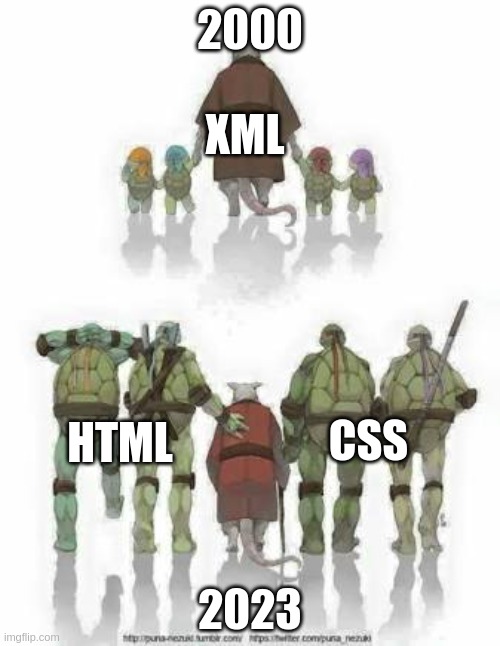, 4 min read
CSS Naked Day
9th April is CSS Naked Day. A day where you do not use CSS on your web-site. In 2024 I participate in this day, i.e., I will deactivate the CSS on this blog.
From the CSS Naked Day:
The idea behind CSS Naked Day is to promote web standards. Plain and simple. This includes proper use of HTML, semantic markup, a good hierarchy structure, and of course, a good old play on words. In the words of 2006, it’s time to show off your
<body>for what it really is.
The importance of CSS is illustrated by this humorous tweet:
1. The 50 hour window
The logic to enable or disable CSS is given by below PHP routine on CSS Naked Day:
<?php
function is_naked_day($d) {
$start = date('U', mktime(-14, 0, 0, 04, $d, date('Y')));
$end = date('U', mktime(36, 0, 0, 04, $d, date('Y')));
$z = date('Z') * -1;
$now = time() + $z;
if ( $now >= $start && $now <= $end ) {
return true;
}
return false;
}
?>
Running this with php -a and unixtimestamp.com for the year 2024 gives the following interval:
- Start: 08-Apr-2024 12:00 CET
- End: 10-Apr-2024 14:00 CET
The rationale is:
CSS Naked Day lasts for one international day. Technically speaking, it will be April 9 somewhere in the world for 50 hours. This is to ensure that everyone’s website will be publicly nude for the entire world to see at any given time during April 9.
2. Required changes in templates
For this blog I use the static site generator Simplified Saaze.
All templates of this generator are written in PHP.
So deactivating CSS is a pretty simple if statement.
I use the following hierarchy of PHP files for my entry-template, i.e., the template for a blog post:
The following hierarchy is used for the index-template, i.e., the template for showing a reverse-date sorted list of blog posts:
3. Changes in <head> section
File head.php does not contain any CSS.
File top-layout.php handles the majority of the HTML <head> section, and the beginning of the <body> section.
I use prism.js for syntax highlighting. This in turn uses CSS, which is surrounded by a simple if:
<?php $NO_CSS = getenv('NO_CSS') ? true : false; ?>
<?php if (isset($entry['prismjs']) && ! $NO_CSS) { ?>
<link href=/jscss/prism.css rel=stylesheet>
<?php } ?>
If I generate all the static HTML files, I use the environment variable NO_CSS.
In case of dynamic generation I simply set $NO_CSS explicitly in top-layout.php, i.e., $NO_CSS=true;.
I have a separate CSS file, called blogklm.css, which I also surround with an if:
<?php if (! $NO_CSS) echo "<style>\n" ?>
<?php if (! $NO_CSS) require SAAZE_PATH . "/public/jscss/blogklm.css" ?>
<?php if (! $NO_CSS) echo "</style>\n" ?>
For galleries and Markmap I had a conditional anyway. This needed an additional clause:
<?php if (!isset($pagination) && ! $NO_CSS) {
if (isset($entry['gallery_css'])) echo $entry['gallery_css'];
if (isset($entry['markmap_css'])) echo $entry['markmap_css'];
} ?>
I use Pagefind for searching within this blog.
Pagefind in turn needs CSS, which is surrounded by an if:
<?php if (! $NO_CSS) { ?>
<link href="/pagefind/pagefind-ui.css" rel="stylesheet">
<script src="/pagefind/pagefind-ui.js"></script>
<script>
window.addEventListener('DOMContentLoaded', (event) => {
new PagefindUI({ element: "#search", showSubResults: true });
});
</script>
<?php } ?>
4. Changes in <body> section
Still in top-layout.php.
Finally, I explicitly mention that I stripped all CSS, so visitors are not surprised to find a new layout:
<?php if ($NO_CSS) echo "<h2> <a href=\"https://css-naked-day.github.io\">April 9 is CSS Naked Day!</a></h2>\n"; ?>
5. History and evolution of CSS Naked Day
Below text is copied from CSS Naked Day and the Missing Wikipedia Page:
The event dates back to 2006, when Dustin Diaz, an American web developer, advertised the first CSS Naked Day in order “to promote web standards.”
During the first two years (2006 and 2007), CSS Naked Day was held on April 5, when in 2008, the date was changed to April 9.
Until 2009, the event was organized by Diaz. From 2010 to 2014, Taylor Satula, an American web designer, ...
From the first CSS Naked Day in 2006, which had 763 recorded participants, engagement went up to 2,160 participants in 2008. After another strong participation in 2009 (1,266 recorded participants), fewer people and sites are documented to have taken part.
In recent years (2020–2023), only a fraction of these participants is known, usually including a few dozen individuals and their sites. While there are no reliable ways to measure participation, it seems clear that while CSS Naked Day is still being observed, that is only the case for a small minority of people in the field. ...
In the months following the 2015 edition, and until today, Basmaison and Meiert have kept maintaining the site and promoting the event together.
The usual omnipresent Wikipedia trolls and naysayer blocked this wiki entry.
